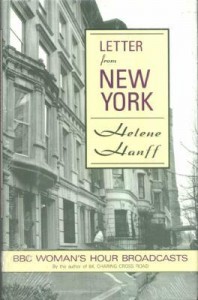 After I treated myself to 84, Charing Cross Road, it was only a matter of time before I reread Helene Hanff’s Letter from New York. This was the book in which I first encountered Miss Hanff—I don’t remember whether I bought it myself or was given it by someone, but I know I read it the year I moved to New York City, and it profoundly influenced my first experiences there. Helene Hanff taught me how to see the quirky and charming characteristics of a neighborhood; she enticed me out of my midtown office building during many a summer lunch hour and sent me scurrying all over Manhattan in search of streets and buildings she’d mentioned.
After I treated myself to 84, Charing Cross Road, it was only a matter of time before I reread Helene Hanff’s Letter from New York. This was the book in which I first encountered Miss Hanff—I don’t remember whether I bought it myself or was given it by someone, but I know I read it the year I moved to New York City, and it profoundly influenced my first experiences there. Helene Hanff taught me how to see the quirky and charming characteristics of a neighborhood; she enticed me out of my midtown office building during many a summer lunch hour and sent me scurrying all over Manhattan in search of streets and buildings she’d mentioned.
Letter from New York is a collection of radio transcripts: a monthly series of five-minute talks Miss Hanff for the BBC Women’s Hour, to share a slice of New York life with London listeners. She describes her building, her neighborhood, her favorite haunts in the city; she tells colorful and wry tales about the customs and opinions of her fellow New Yorkers. Delicious stuff.
Of all the talks, the story I remembered the most clearly was the one about the Shakespeare Garden. If you recall, I kept waiting for that part of Charing Cross Road and only realized halfway through that I’d got the wrong book.
It was in May 1979 that Miss Hanff told her BBC listeners about the corner of Central Park known as the Shakespeare Garden:
It was perched on a small hilltop and reached by high stone steps. It had flower beds blooming in spring, summer, and autumn, and a famous mulberry tree; it had a little stone moat for irrigation, with a small footbridge across it…The first park gardener I met there told me it was begun in the 1900s and was modeled on Shakespeare’s garden in Stratford. A later gardener said that the garden contained every flower mentioned in Shakespeare’s plays. He used to identify them, for ignoramuses like me. And he always pointed out the big mulberry tree grown from a cutting of a tree in Shakespeare’s own garden.
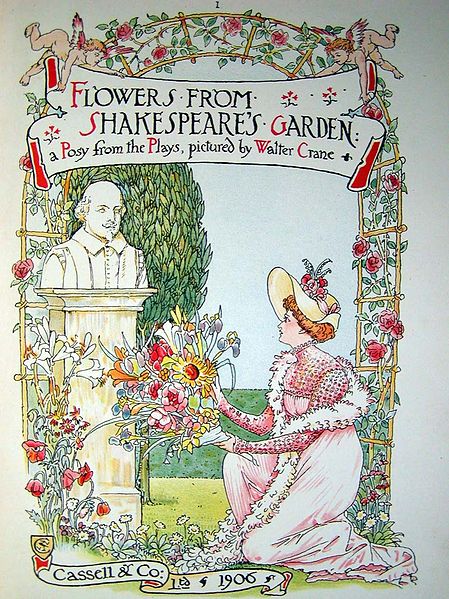
Unfortunately, as Miss Hanff explains, New York City had budget troubles and let the park gardeners go. The Shakespeare garden fell into ruin, such a depressing sight that Helene stopped walking past it; she couldn’t bear to see.
But a young couple who lived near the park couldn’t avoid it. They walked past the abandoned hilltop on their way to work on pleasant mornings. And so, on Sunday in May a couple of years ago, Peggy-the-schoolteacher and John-the-lawyer climbed the stone steps—with buckets of earth and buckets of water and garden tools—and began to dig. They worked all day; and the next Saturday they went back to the hilltop and worked all weekend.
A few neighbors and passersby saw them working and joined them. From then on, the volunteers worked weekends all spring and summer, and all the net spring and summer. And this year the garden is beginning to bloom again.
It’s not the Shakespeare Garden it once was. Peggy told me we can’t get English wildflower seeds over here. So the garden has no cowslips or harebells, and there’s no border of English roses anyore. But we still call it the Shakespeare Garden. And in a city of cliff dweller, it’s a small miracle to have Central Park’s only garden growing again, even if it’s not the English garden I loved.
But the story doesn’t end there. The following June, Miss Hanff had this to say to her BBC audience:
A year ago, I told you about the Shakespeare Garden in Central Park which had gone to seed when the city could no longer afford gardeners, and which a handful of New Yorkers had begun to recreate here. I said that the new garden could never be a real Shakespeare garden, since we couldn’t get English wildflower seeds over here. Well, a few generous Woman’s Hour listeners promptly rushed out and mailed us wildflower seeds, and I am now able to report that the cowslips and harebells are blooming, and so is the dyer’s work. And along the rustic wooden fence at the far rim of the garden—for the first time in ten years—the gold-centered, white English garden roses are blooming again. The Shakespeare Gardeners thank you, New York thanks you, and I can’t tell you wahat it meant to me, to see the long row of yellow buds flower into white roses again, like a like of small Phoenixes rising from the ashes. Thank you!
Most wonderful wonderful, out of all hooping.
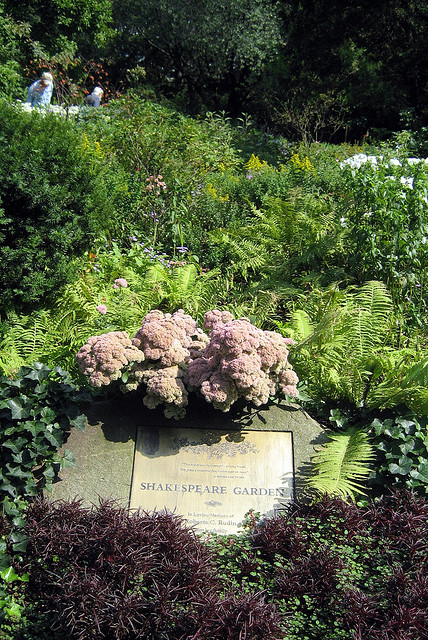
Photo by wallyg, used under Creative Commons license
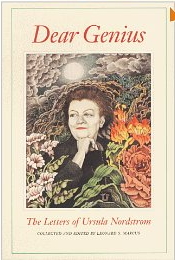 A book of letters I ought to have included in my ode to epistles and epistolaries the other day: Dear Genius: The Letters of Ursula Nordstrom. Miss Nordstrom, the pioneering editor behind Harper’s Department of Books for Boys and Girls from 1940 to 1973, was something of a genius herself. The list of children’s classics she was responsible for publishing is staggeringly long and awesome: Little Bear, Where the Wild Things Are, Goodnight Moon, Danny and the Dinosaur, Where the Sidewalk ends, Harold and the Purple Crayon, oh and a little thing called Charlotte’s Web—to name a very few.
A book of letters I ought to have included in my ode to epistles and epistolaries the other day: Dear Genius: The Letters of Ursula Nordstrom. Miss Nordstrom, the pioneering editor behind Harper’s Department of Books for Boys and Girls from 1940 to 1973, was something of a genius herself. The list of children’s classics she was responsible for publishing is staggeringly long and awesome: Little Bear, Where the Wild Things Are, Goodnight Moon, Danny and the Dinosaur, Where the Sidewalk ends, Harold and the Purple Crayon, oh and a little thing called Charlotte’s Web—to name a very few.
Dear Genius is a collection of letters she wrote to authors, illustrators, reviewers, even parents and children who had written with responses to her books. She is unfailingly poised, charming, and insightful, even when responding to criticism. And her voice, oh her wonderful voice! Her letters are simply crammed with personality—she is wry, teasing, incisive, direct, and altogether brilliant.
Her editorial letters provide a fascinating look at the history of children’s publishing in America, both on the grand scale of publishing trends and literary vision, and on the micro scale of word choices for a single line of a specific book. For instance, in a 1957 letter to Syd Hoff about Danny and the Dinosaur, an early “I Can Read” book for beginning readers: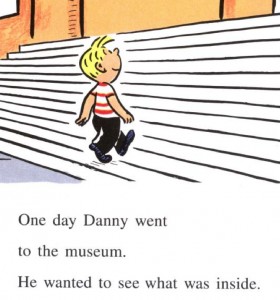
I think you should just say “One day Danny went to the museum.” (He didn’t actually want to “see how the world looked a long, long time ago,” as you put it, do you think? Very unchildlike. He might have wanted to go to see the dead mummies, or other specific things in a museum, but I wouldn’t mention that here because you mention it on following pages. So just have a simple statement on this first page. “One day Danny went to the museum.”) It is pretty short and if you can think of one more short sentence for this page by all means add it. I can’t come up with any suggestion myself. Page 8: You’ll have to simplify what he saw on this page. NOT THAT I WANT YOU TO GET SELF-CONSCIOUS ABOUT “I CAN READ.” I told you I wanted you to let me worry about that aspect and that’s all I’m doing now. You could just say “He saw Indians. He saw bears. He saw…” I haven’t been in a museum in 150 years and can’t think of anything else, but you can.
Or, in September 1963:
Maurice, before I sent the paste-up I went through it, rereading the words, and looking at the pictures again. It is MOST MAGNIFICENT, and we’re so proud to have it on our list. When you were much younger, and had done only a couple of books, I remember I used to write you letters when the books were finished, and thank you for “another beautiful” job—or some such dopiness. Now you’re rich and famous and need no words of wonder from me. But I must send them, anyhow, when I look through Where the Wild Things Are. I think it is utterly magnificent, and the words are beautiful and meaningful, and it does just want you wanted it to do. And you did just what you wanted to do.
Or, from a reply to a reader of Little House on the Prairie in 1952:
Your letter to Mrs. Wilder…came several weeks ago. We took the liberty of opening it as we do many of the letters that are addressed to Mrs. Wilder…[she] is now in her late eighties and we try to handle much of her correspondence here.
We were indeed disturbed by your letter. We knew that Mrs. Wilder had not meant to imply that Indians were not people and we did not want to distress her if we could possibly avoid it. I must admit to you that no one here realized that those words read as they did. Reading them now it seems unbelievable to me that you are the only person who has picked them up and written to us about them in the twenty years since the book was published. We were particularly disturbed because all of us here feel just as strongly as you apparently feel about such subjects, and we are proud that many of the books on the Harper list prove that. Perhaps it is a hopeful sign that though such a statement could have passed unquestioned twenty years ago it would never have appeared in anything published in recent years.
Instead of forwarding your letter to Mrs. Wilder I wrote her about the passage and said that in reprinting we hoped that she would allow us to change it. I have just received her answer. She says: “You are perfectly right about the fault in Little House on the Prairie and have my permission to make the correction you suggest. It was a stupid blunder of mine. Of course Indians are people and I did not mean to imply they were not.” We are changing the next printing to read “There were no settlers.”
Fascinating. I could quote from this book all day but you’re much better off scrounging up a copy yourself.
(Updated.)
Little Brother and Down and Out in the Magic Kingdom by Cory Doctorow. (Blogged about Down & Out here.)
and Down and Out in the Magic Kingdom by Cory Doctorow. (Blogged about Down & Out here.)
“The Sisters” by James Joyce.
Damosel: In Which the Lady of the Lake Renders a Frank and Often Startling Account of her Wondrous Life and Times by Stephanie Spinner.
by Stephanie Spinner.
The Film Club: A Memoir by David Gilmour.
by David Gilmour.
Stolen by Vivian Vande Velde. (Notes.)
by Vivian Vande Velde. (Notes.)
Secret History of the Authority: Hawksmoor by Mike Costa and Fiona Staples.
by Mike Costa and Fiona Staples.
Coraline by Neil Gaiman. (Notes.)
by Neil Gaiman. (Notes.)
Rules by Cynthia Lord. (Notes.)
by Cynthia Lord. (Notes.)
The Plain Princess by Phyllis McGinley.
by Phyllis McGinley.
The Sherwood Ring by Elizabeth Marie Pope. (Review.)
by Elizabeth Marie Pope. (Review.)
The Polysyllabic Spree by Nick Hornby.
by Nick Hornby.
 Hmm, almost all fiction this month, except for Film Club and the Hornby book. I knew it was a mistake to pick up the Hornby; The Polysyllabic Spree is a collection of Nick Hornby’s monthly books column for The Believer. Nick writes exactly the kind of essays I love to read—and write, for that matter—conversational ruminations on the books he has read, or purchased and not read, or thought about reading, in the previous month. Here I am already with a house full of books whispering my name in rustling voices, and a list of ooh-gotta-score-a-copy-of-that-one titles gleaned from sources like last year’s favorite book-essay collection, A Reader’s Delight, and now, stupidly, I’ve gone and let Nick Hornby get me all fired up to read a bunch of the books he read in 2004.
Hmm, almost all fiction this month, except for Film Club and the Hornby book. I knew it was a mistake to pick up the Hornby; The Polysyllabic Spree is a collection of Nick Hornby’s monthly books column for The Believer. Nick writes exactly the kind of essays I love to read—and write, for that matter—conversational ruminations on the books he has read, or purchased and not read, or thought about reading, in the previous month. Here I am already with a house full of books whispering my name in rustling voices, and a list of ooh-gotta-score-a-copy-of-that-one titles gleaned from sources like last year’s favorite book-essay collection, A Reader’s Delight, and now, stupidly, I’ve gone and let Nick Hornby get me all fired up to read a bunch of the books he read in 2004.
Even worse, there are two more volumes of these Hornby columns, and of course I’m dying to read those too. And the library doesn’t have them. If I spend money (or even Amazon gift certificate dough) to buy more books about books I’ll then want to buy, somebody please hit me over the head with a copy of Home Comforts.
 I enjoyed Film Club but I think I had a hard time letting it be the book it IS instead of the book I thought it was going to be (or the book I wanted it to be). It’s the true account of how film critic David Gilmour made a deal with his teenaged son: Jesse, a 10th grader, could drop out of school on the condition that he’d watch three movies a week with his dad. I heard about this book and immediately pegged it as kind of unschooling manifesto, full of anecdotes about the amazing learning experiences and deepened relationships that grew out of this family’s unorthodox decision. And the book IS about learning and about deepened relationships, but not at all in the way I imagined; it isn’t waving a banner for autodidactism or alternative education. It isn’t putting forth a thesis or advocating a philosophy: it is exactly what it claims to be: a memoir, a true account of a few years in the life of a father and son. Gilmour recognizes that these years with Jesse, the last years of Jesse’s residency under his father’s roof, are a treasure to be cherished, and his movie-viewing plan is more about spending time together than education. Both father and son DO learn a lot, of course. David chooses the films carefully, sometimes focusing on landmarks of cinematic history, other times riffing on the dramas of Jesse’s personal life. (Lots of girl stuff going on with the boy, to put it mildly.)
I enjoyed Film Club but I think I had a hard time letting it be the book it IS instead of the book I thought it was going to be (or the book I wanted it to be). It’s the true account of how film critic David Gilmour made a deal with his teenaged son: Jesse, a 10th grader, could drop out of school on the condition that he’d watch three movies a week with his dad. I heard about this book and immediately pegged it as kind of unschooling manifesto, full of anecdotes about the amazing learning experiences and deepened relationships that grew out of this family’s unorthodox decision. And the book IS about learning and about deepened relationships, but not at all in the way I imagined; it isn’t waving a banner for autodidactism or alternative education. It isn’t putting forth a thesis or advocating a philosophy: it is exactly what it claims to be: a memoir, a true account of a few years in the life of a father and son. Gilmour recognizes that these years with Jesse, the last years of Jesse’s residency under his father’s roof, are a treasure to be cherished, and his movie-viewing plan is more about spending time together than education. Both father and son DO learn a lot, of course. David chooses the films carefully, sometimes focusing on landmarks of cinematic history, other times riffing on the dramas of Jesse’s personal life. (Lots of girl stuff going on with the boy, to put it mildly.)
Once I got a handle on what the book was and let it be itself instead of the unschooling celebration I expected it to be, I enjoyed the book a whole lot (though Gilmour and I come from very different places regarding certain moral issues). Mostly I wanted to hear more about the films: the best parts of the book are the conversations between David and Jesse about the films, and most especially David’s commentary during the films. I am now dying to see James Dean in Giant.
 I’ve already written about most of the fiction I read in March. It was a great month for fiction. I really enjoyed Damosel, an Arthurian romance by my former boss, Stephanie Spinner. Stephanie has kindly agreed to let me interview her here on the blog and I’m pretty excited about that. Damosel is lyrical and lovely, and I love the way it takes a minor figure from the Arthurian legend and expands her, lets us look at some old familiar tales from a completely fresh perspective. (I don’t think I’ve ever felt the tragedy of Merlin’s fate quite so keenly.) Who was that mysterious Lady presenting Excalibur from the murky depths of the Lake? In the legend she is little more than an arm. Stephanie made her a whole person, a complicated person with conflicts and yearnings, powers and limits. There is such an air of wistfulness about the book, as the fairy Lady looks upon the intrigues of mortals first from a cool distance, and then increasingly with an emotional connection to the people she once regarded with comfortable detachment. But it’s a funny book, too, very wry, and the Lady’s innumerable Rules—the Rules governing the behavior of Ladies of the Lake—made me laugh out loud more than once.
I’ve already written about most of the fiction I read in March. It was a great month for fiction. I really enjoyed Damosel, an Arthurian romance by my former boss, Stephanie Spinner. Stephanie has kindly agreed to let me interview her here on the blog and I’m pretty excited about that. Damosel is lyrical and lovely, and I love the way it takes a minor figure from the Arthurian legend and expands her, lets us look at some old familiar tales from a completely fresh perspective. (I don’t think I’ve ever felt the tragedy of Merlin’s fate quite so keenly.) Who was that mysterious Lady presenting Excalibur from the murky depths of the Lake? In the legend she is little more than an arm. Stephanie made her a whole person, a complicated person with conflicts and yearnings, powers and limits. There is such an air of wistfulness about the book, as the fairy Lady looks upon the intrigues of mortals first from a cool distance, and then increasingly with an emotional connection to the people she once regarded with comfortable detachment. But it’s a funny book, too, very wry, and the Lady’s innumerable Rules—the Rules governing the behavior of Ladies of the Lake—made me laugh out loud more than once.
 After I treated myself to 84, Charing Cross Road, it was only a matter of time before I reread Helene Hanff’s Letter from New York. This was the book in which I first encountered Miss Hanff—I don’t remember whether I bought it myself or was given it by someone, but I know I read it the year I moved to New York City, and it profoundly influenced my first experiences there. Helene Hanff taught me how to see the quirky and charming characteristics of a neighborhood; she enticed me out of my midtown office building during many a summer lunch hour and sent me scurrying all over Manhattan in search of streets and buildings she’d mentioned.
After I treated myself to 84, Charing Cross Road, it was only a matter of time before I reread Helene Hanff’s Letter from New York. This was the book in which I first encountered Miss Hanff—I don’t remember whether I bought it myself or was given it by someone, but I know I read it the year I moved to New York City, and it profoundly influenced my first experiences there. Helene Hanff taught me how to see the quirky and charming characteristics of a neighborhood; she enticed me out of my midtown office building during many a summer lunch hour and sent me scurrying all over Manhattan in search of streets and buildings she’d mentioned.




 Hmm, almost all fiction this month, except for
Hmm, almost all fiction this month, except for  I enjoyed
I enjoyed  I’ve already written about most of the fiction I read in March. It was a great month for fiction. I really enjoyed
I’ve already written about most of the fiction I read in March. It was a great month for fiction. I really enjoyed